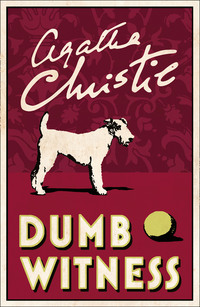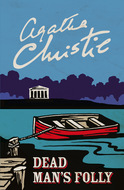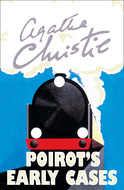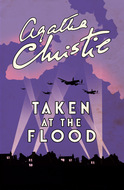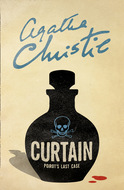Kitap dosya olarak indirilemez ancak uygulamamız üzerinden veya online olarak web sitemizden okunabilir.
Kitabı oku: «Dumb Witness»

Dumb Witness

Published by HarperCollinsPublishers Ltd
1 London Bridge Street
London SE1 9GF
First published in Great Britain by
Collins 1937
Agatha Christie® Poirot® Dumb Witness™
Copyright © 1937 Agatha Christie Limited. All rights reserved.
A catalogue record of this book is available from the British Library.
Cover design © HarperCollinsPublishers Ltd 2015
Title lettering by Ghost Design
Cover photograph © Polly Eltes/PlainPicture
Agatha Christie asserts the moral right to be identified as the author of this work.
A catalogue copy of this book is available from the British Library.
This novel is entirely a work of fiction. The names, characters and incidents portrayed in it are the work of the author’s imagination. Any resemblance to actual persons, living or dead, events or localities is entirely coincidental.
All rights reserved under International and Pan-American Copyright Conventions. By payment of the required fees, you have been granted the non-exclusive, non-transferable right to access and read the text of this e-book on screen. No part of this text may be reproduced, transmitted, down-loaded, decompiled, reverse engineered, or stored in or introduced into any information storage and retrieval system, in any form or by any means, whether electronic or mechanical, now known or hereinafter invented, without the express written permission of HarperCollins.
Source ISBN: 9780008129569
Ebook Edition © September 2015 ISBN: 9780007422302
Version: 2017-04-12
TO DEAR PETER, MOST FAITHFUL OF FRIENDS AND DEAREST OF COMPANIONS, A DOG IN A THOUSAND
Contents
Cover
Title Page
Copyright
Dedication
CHAPTER 1: The Mistress of Littlegreen House
CHAPTER 2: The Relations
CHAPTER 3: The Accident
CHAPTER 4: Miss Arundell Writes a Letter
CHAPTER 5: Hercule Poirot Receives a Letter
CHAPTER 6: We Go to Littlegreen House
CHAPTER 7: Lunch at the George
CHAPTER 8: Interior of Littlegreen House
CHAPTER 9: Reconstruction of the Dog’s Ball Incident
CHAPTER 10: Visit to Miss Peabody
CHAPTER 11: Visit to the Misses Tripp
CHAPTER 12: Poirot Discusses the Case
CHAPTER 13: Theresa Arundell
CHAPTER 14: Charles Arundell
CHAPTER 15: Miss Lawson
CHAPTER 16: Mrs Tanios
CHAPTER 17: Dr Tanios
CHAPTER 18: ‘A Wolf in the Manger’
CHAPTER 19: Visit to Mr Purvis
CHAPTER 20: Second Visit to Littlegreen House
CHAPTER 21: The Chemist; The Nurse; The Doctor
CHAPTER 22: The Woman on the Stairs
CHAPTER 23: Dr Tanios Calls on Us
CHAPTER 24: Theresa’s Denial
CHAPTER 25: I Lie Back and Reflect
CHAPTER 26: Mrs Tanios Refuses to Speak
CHAPTER 27: Visit of Dr Donaldson
CHAPTER 28: Another Victim
CHAPTER 29: Inquest at Littlegreen House
CHAPTER 30: The Last Word
ALSO BY AGATHA CHRISTIE
About the Publisher
CHAPTER 1
The Mistress of Littlegreen House
Miss Arundell died on May 1st. Though her illness was short her death did not occasion much surprise in the little country town of Market Basing where she had lived since she was a girl of sixteen. For Emily Arundell was well over seventy, the last of a family of five, and she had been known to be in delicate health for many years and had indeed nearly died of a similar attack to the one that killed her some eighteen months before.
But though Miss Arundell’s death surprised no one, something else did. The provisions of her will gave rise to varying emotions, astonishment, pleasurable excitement, deep condemnation, fury, despair, anger and general gossip. For weeks and even months Market Basing was to talk of nothing else! Everyone had their own contribution to make to the subject from Mr Jones the grocer, who held that ‘blood was thicker than water’, to Mrs Lamphrey at the post office, who repeated ad nauseam that ‘there’s something behind it, depend upon it! You mark my words.’
What added zest to the speculations on the subject was the fact that the will had been made as lately as April 21st. Add to this the further fact that Emily Arundell’s near relations had been staying with her just before that date over Easter Bank Holiday and it will be realized that the most scandalous theories could be propounded, pleasurably relieving the monotony of everyday life in Market Basing.
There was one person who was shrewdly suspected of knowing more about the matter than she was willing to admit. That was Miss Wilhelmina Lawson, Miss Arundell’s companion. Miss Lawson, however, professed herself just as much in the dark as everyone else. She, too, she declared, had been dumbfounded when the will was read out.
A lot of people, of course, did not believe this. Nevertheless, whether Miss Lawson was or was not as ignorant as she declared herself to be, only one person really knew the true facts. That person was the dead woman herself. Emily Arundell had kept her own counsel as she was in the habit of doing. Even to her lawyer she had said nothing of the motives underlying her action. She was content with making her wishes clear.
In that reticence could be found the keynote of Emily Arundell’s character. She was, in every respect, a typical product of her generation. She had both its virtues and its vices. She was autocratic and often overbearing, but she was also intensely warm-hearted. Her tongue was sharp but her actions were kind. She was outwardly sentimental but inwardly shrewd. She had a succession of companions whom she bullied unmercifully, but treated with great generosity. She had a great sense of family obligation.
On the Friday before Easter Emily Arundell was standing in the hall of Littlegreen House giving various directions to Miss Lawson.
Emily Arundell had been a handsome girl and she was now a well-preserved handsome old lady with a straight back and a brisk manner. A faint yellowness in her skin was a warning that she could not eat rich food with impunity.
Miss Arundell was saying:
‘Now then, Minnie, where have you put them all?’
‘Well, I thought—I hope I’ve done right—Dr and Mrs Tanios in the Oak room and Theresa in the Blue room and Mr Charles in the Old Nursery—’
Miss Arundell interrupted:
‘Theresa can have the Old Nursery and Charles will have the Blue room.’
‘Oh, yes—I’m sorry—I thought the Old Nursery being rather more inconvenient—’
‘It will do very nicely for Theresa.’
In Miss Arundell’s day, women took second place. Men were the important members of society.
‘I’m so sorry the dear little children aren’t coming,’ murmured Miss Lawson, sentimentally.
She loved children and was quite incapable of managing them.
‘Four visitors will be quite enough,’ said Miss Arundell. ‘In any case Bella spoils her children abominably. They never dream of doing what they are told.’
Minnie Lawson murmured:
‘Mrs Tanios is a very devoted mother.’
Miss Arundell said with grave approval:
‘Bella is a good woman.’
Miss Lawson sighed and said:
‘It must be very hard for her sometimes—living in an outlandish place like Smyrna.’
Emily Arundell replied:
‘She has made her bed and she must lie on it.’
And having uttered this final Victorian pronouncement she went on:
‘I am going to the village now to speak about the orders for the weekend.’
‘Oh, Miss Arundell, do let me. I mean—’
‘Nonsense. I prefer to go myself. Rogers needs a sharp word. The trouble with you is, Minnie, that you’re not emphatic enough. Bob! Bob! Where is the dog?’
A wire-haired terrier came tearing down the stairs. He circled round and round his mistress uttering short staccato barks of delight and expectation.
Together mistress and dog passed out of the front door and down the short path to the gate.
Miss Lawson stood in the doorway smiling rather foolishly after them, her mouth a little open. Behind her a voice said tartly:
‘Them pillowcases you gave me, miss, isn’t a pair.’
‘What? How stupid of me…’
Minnie Lawson plunged once more into household routine.
Emily Arundell, attended by Bob, made a royal progress down the main street of Market Basing.
It was very much of a royal progress. In each shop she entered the proprietor always hurried forward to attend to her.
She was Miss Arundell of Littlegreen House. She was ‘one of our oldest customers’. She was ‘one of the old school. Not many about like her nowadays’.
‘Good morning, miss. What can I have the pleasure of doing for you—Not tender? Well, I’m sorry to hear that. I thought myself it was as nice a little saddle—Yes, of course, Miss Arundell. If you say so, it is so—No, indeed I wouldn’t think of sending Canterbury to you, Miss Arundell—Yes, I’ll see to it myself, Miss Arundell.’
Bob and Spot, the butcher’s dog, circled slowly round each other, hackles raised, growling gently. Spot was a stout dog of nondescript breed. He knew that he must not fight with customers’ dogs, but he permitted himself to tell them, by subtle indication, just exactly what mincemeat he would make of them were he free to do so.
Bob, a dog of spirit, replied in kind.
Emily Arundell said ‘Bob!’ sharply and passed on.
In the greengrocer’s there was a meeting of heavenly bodies. Another old lady, spherical in outline, but equally distinguished by that air of royalty, said:
‘Mornin’, Emily.’
‘Good morning, Caroline.’
Caroline Peabody said:
‘Expecting any of your young people down?’
‘Yes, all of them. Theresa, Charles and Bella.’
‘So Bella’s home, is she? Husband too?’
‘Yes.’
It was a simple monosyllable, but underlying it was knowledge common to both ladies.
For Bella Biggs, Emily Arundell’s niece, had married a Greek. And Emily Arundell’s people, who were what is known as ‘all service people’, simply did not marry Greeks.
By way of being obscurely comforting (for of course such a matter could not be referred to openly) Miss Peabody said:
‘Bella’s husband’s got brains. And charming manners!’
‘His manners are delightful,’ agreed Miss Arundell.
Moving out into the street Miss Peabody asked:
‘What’s this about Theresa being engaged to young Donaldson?’
Miss Arundell shrugged her shoulders.
‘Young people are so casual nowadays. I’m afraid it will have to be a rather long engagement—that is, if anything comes of it. He has no money.’
‘Of course Theresa has her own money,’ said Miss Peabody.
Miss Arundell said stiffly:
‘A man could not possibly wish to live on his wife’s money.’
Miss Peabody gave a rich, throaty chuckle.
‘They don’t seem to mind doing it, nowadays. You and I are out of date, Emily. What I can’t understand is what the child sees in him. Of all the namby-pamby young men!’
‘He’s a clever doctor, I believe.’
‘Those pince-nez—and that stiff way of talking! In my young days we’d have called him a poor stick!’
There was a pause while Miss Peabody’s memory, diving into the past, conjured up visions of dashing, bewhiskered young men…
She said with a sigh:
‘Send that young dog Charles along to see me—if he’ll come.’
‘Of course. I’ll tell him.’
The two ladies parted.
They had known each other for considerably over fifty years. Miss Peabody knew of certain regrettable lapses in the life of General Arundell, Emily’s father. She knew just precisely what a shock Thomas Arundell’s marriage had been to his sisters. She had a very shrewd idea of certain troubles connected with the younger generation.
But no word had ever passed between the two ladies on any of these subjects. They were both upholders of family dignity, family solidarity, and complete reticence on family matters.
Miss Arundell walked home, Bob trotting sedately at her heels. To herself, Emily Arundell admitted what she would never have admitted to another human being, her dissatisfaction with the younger generation of her family.
Theresa, for instance. She had no control over Theresa since the latter had come into her own money at the age of twenty-one. Since then the girl had achieved a certain notoriety. Her picture was often in the papers. She belonged to a young, bright, go-ahead set in London—a set that had freak parties and occasionally ended up in the police courts. It was not the kind of notoriety that Emily Arundell approved of for an Arundell. In fact, she disapproved very much of Theresa’s way of living. As regards the girl’s engagement, her feelings were slightly confused. On the one hand she did not consider an upstart Dr Donaldson good enough for an Arundell. On the other she was uneasily conscious that Theresa was a most unsuitable wife for a quiet country doctor.
With a sigh her thoughts passed on to Bella. There was no fault to find with Bella. She was a good woman—a devoted wife and mother, quite exemplary in behaviour—and extremely dull! But even Bella could not be regarded with complete approval. For Bella had married a foreigner—and not only a foreigner—but a Greek. In Miss Arundell’s prejudiced mind a Greek was almost as bad as an Argentine or a Turk. The fact that Dr Tanios had a charming manner and was said to be extremely able in his profession only prejudiced the old lady slightly more against him. She distrusted charm and easy compliments. For this reason, too, she found it difficult to be fond of the two children. They had both taken after their father in looks—there was really nothing English about them.
And then Charles…
Yes, Charles…
It was no use blinding one’s eyes to facts. Charles, charming though he was, was not to be trusted…
Emily Arundell sighed. She felt suddenly tired, old, depressed…
She supposed that she couldn’t last much longer…
Her mind reverted to the will she had made some years ago.
Legacies to the servants—to charities—and the main bulk of her considerable fortune to be divided equally between these, her three surviving relations…
It still seemed to her that she had done the right and equitable thing. It just crossed her mind to wonder whether there might not be some way of securing Bella’s share of the money so that her husband could not touch it… She must ask Mr Purvis.
She turned in at the gate of Littlegreen House.
Charles and Theresa Arundell arrived by car—the Tanioses, by train.
The brother and sister arrived first. Charles, tall and good-looking, with his slightly mocking manner, said:
‘Hullo, Aunt Emily, how’s the girl? You look fine.’
And he kissed her.
Theresa put an indifferent young cheek against her withered one.
‘How are you, Aunt Emily?’
Theresa, her aunt thought, was looking far from well. Her face, beneath its plentiful make-up, was slightly haggard and there were lines round her eyes.
They had tea in the drawing-room. Bella Tanios, her hair inclined to straggle in wisps from below the fashionable hat that she wore at the wrong angle, stared at her cousin Theresa with a pathetic eagerness to assimilate and memorize her clothes. It was poor Bella’s fate in life to be passionately fond of clothes without having any clothes sense. Theresa’s clothes were expensive, slightly bizarre, and she herself had an exquisite figure.
Bella, when she arrived in England from Smyrna, had tried earnestly to copy Theresa’s elegance at an inferior price and cut.
Dr Tanios, who was a big bearded jolly looking man, was talking to Miss Arundell. His voice was warm and full—an attractive voice that charmed a listener almost against his or her will. Almost in spite of herself, it charmed Miss Arundell.
Miss Lawson was fidgeting a good deal. She jumped up and down, handing plates, fussing over the tea-table. Charles, whose manners were excellent, rose more than once to help her, but she expressed no gratitude.
When, after tea, the party went out to make a tour of the garden Charles murmured to his sister:
‘Lawson doesn’t like me. Odd, isn’t it?’
Theresa said, mockingly:
‘Very odd. So there is one person who can withstand your fatal fascination?’
Charles grinned—an engaging grin—and said:
‘Lucky it’s only Lawson…’
In the garden Miss Lawson walked with Mrs Tanios and asked her questions about the children. Bella Tanios’ rather drab face lighted up. She forgot to watch Theresa. She talked eagerly and animatedly. Mary had said such a quaint thing on the boat…
She found Minnie Lawson a most sympathetic listener.
Presently a fair-haired young man with a solemn face and pince-nez was shown into the garden from the house. He looked rather embarrassed. Miss Arundell greeted him politely.
Theresa said:
‘Hullo, Rex!’
She slipped an arm through his. They wandered away.
Charles made a face. He slipped away to have a word with the gardener, an ally of his from old days.
When Miss Arundell re-entered the house Charles was playing with Bob. The dog stood at the top of the stairs, his ball in his mouth, his tail gently wagging.
‘Come on, old man,’ said Charles.
Bob sank down on his haunches, nosed his ball slowly and slowly nearer the edge. As he finally bunted it over he sprang to his feet in great excitement. The ball bumped slowly down the stairs. Charles caught it and tossed it up to him. Bob caught it neatly in his mouth. The performance was repeated.
‘Regular game of his, this,’ said Charles.
Emily Arundell smiled.
‘He’ll go on for hours,’ she said.
She turned into the drawing-room and Charles followed her. Bob gave a disappointed bark.
Glancing through the window Charles said:
‘Look at Theresa and her young man. They are an odd couple!’
‘You think Theresa is really serious over this?’
‘Oh, she’s crazy about him!’ said Charles with confidence. ‘Odd taste, but there it is. I think it must be the way he looks at her as though she were a scientific specimen and not a live woman. That’s rather a novelty for Theresa. Pity the fellow’s so poor. Theresa’s got expensive tastes.’
Miss Arundell said drily:
‘I’ve no doubt she can change her way of living—if she wants to! And after all she has her own income.’
‘Eh? Oh yes, yes, of course.’
Charles shot an almost guilty look at her.
That evening, as the others were assembled in the drawing-room waiting to go in to dinner, there was a scurry and a burst of profanity on the stairs. Charles entered with his face rather red.
‘Sorry, Aunt Emily, am I late? That dog of yours nearly made me take the most frightful toss. He’d left that ball of his on the top of the stairs.’
‘Careless little doggie,’ cried Miss Lawson, bending down to Bob.
Bob looked at her contemptuously and turned his head away.
‘I know,’ said Miss Arundell. ‘It’s most dangerous. Minnie, fetch the ball and put it away.’
Miss Lawson hurried out.
Dr Tanios monopolized the conversation at the dinner-table most of the time. He told amusing stories of his life in Smyrna.
The party went to bed early. Miss Lawson carrying wool, spectacles, a large velvet bag and a book accompanied her employer to her bedroom chattering happily.
‘Really most amusing, Dr Tanios. He is such good company! Not that I should care for that kind of life myself… One would have to boil the water, I expect… And goat’s milk, perhaps—such a disagreeable taste—’
Miss Arundell snapped:
‘Don’t be a fool, Minnie. You told Ellen to call me at half-past six?’
‘Oh, yes, Miss Arundell. I said no tea, but don’t you think it might be wiser—You know, the vicar at Southbridge—a most conscientious man, told me distinctly that there was no obligation to come fasting—’
Once more Miss Arundell cut her short.
‘I’ve never yet taken anything before Early Service and I’m not going to begin now. You can do as you like.’
‘Oh, no—I didn’t mean—I’m sure—’
Miss Lawson was flustered and upset.
‘Take Bob’s collar off,’ said Miss Arundell.
The slave hastened to obey.
Still trying to please she said:
‘Such a pleasant evening. They all seem so pleased to be here.’
‘Hmph,’ said Emily Arundell. ‘All here for what they can get.’
‘Oh, dear Miss Arundell—’
‘My good Minnie, I’m not a fool whatever else I am! I just wonder which of them will open the subject first.’
She was not long left in doubt on that point. She and Miss Lawson returned from attending Early Service just after nine. Dr and Mrs Tanios were in the dining-room, but there were no signs of the two Arundells. After breakfast, when the others had left, Miss Arundell sat on, entering up some accounts in a little book.
Charles entered the room about ten.
‘Sorry I’m late, Aunt Emily. But Theresa’s worse. She’s not unclosed an eyelid yet.’
‘At half-past ten breakfast will be cleared away,’ said Miss Arundell. ‘I know it is the fashion not to consider servants nowadays, but that is not the case in my house.’
‘Good. That’s the true diehard spirit!’
Charles helped himself to kidneys and sat down beside her.
His grin, as always, was very attractive. Emily Arundell soon found herself smiling indulgently at him. Emboldened by this sign of favour, Charles plunged.
‘Look here, Aunt Emily, sorry to bother you, but I’m in the devil of a hole. Can you possibly help me out? A hundred would do it.’
His aunt’s face was not encouraging. A certain grimness showed itself in her expression.
Emily Arundell was not afraid of speaking her mind. She spoke it.
Miss Lawson hustling across the hall almost collided with Charles as he left the dining-room. She glanced at him curiously. She entered the dining-room to find Miss Arundell sitting very upright with a flushed face.
Ücretsiz ön izlemeyi tamamladınız.
